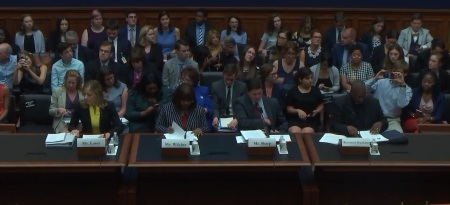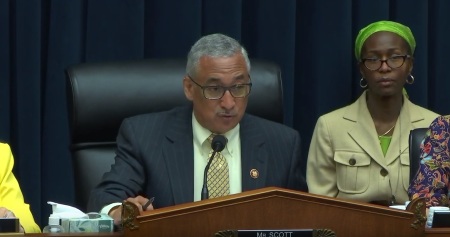Democrat-controlled House panel debates whether to weaken landmark religious freedom law

A House of Representatives committee held a meeting with two expert panels to debate whether the Religious Freedom Restoration Act should be limited in its scope in response to recent decisions by the United States Supreme Court and actions by the Trump administration.
The House Committee on Education and Labor held a hearing Tuesday titled “Do No Harm: Examining the Misapplication of the Religious Freedom Restoration Act.”
RFRA passed in 1993 with bipartisan, almost unanimous support and was signed by Democrat President Bill Clinton. The law was a reaction to a Supreme Court decision opposing the rights of members of the Native American Church to use peyote, a banned hallucinogenic drug, as part of a religious ritual. It was supported at the time by a large coalition of both liberal and conservative groups. In recent years, however, the law has become controversial as religious conservatives have used the law to defend their right to dissent to liberal agenda items related to abortion and same-sex marriage.

Democrat Representative Bobby Scott of Virginia, chair of the committee, claimed that since its passage in 1993, “RFRA has since been used to legitimize housing discrimination against single mothers and minorities, shield church groups from paying child abuse victims, and impose extreme emotional harm on school children based on their gender identity.”
“Since the beginning of the Trump administration, this troublesome trend has only gotten worse,” stated Rep. Scott, arguing that the administration’s guidance on RFRA allows “individuals to use conscience-based objections to override civil rights protections.”
“The guidance has provided legal cover for the administration to permit or even promote government-sanctioned attacks on civil rights and employment, healthcare, foster care, and other areas under the guise of religious liberty. These attacks are spreading.”
Republican Representative Virginia Foxx of North Carolina, ranking member of the committee, defended RFRA as a valuable means of defending religious freedom.
“RFRA stands as our nation’s primary religious liberty statute, enacted to ensure that all Americans can freely express their faith, without fear of discrimination,” Foxx said.
“It recognizes the importance of all religious faiths, including religious minorities and offers a safe haven for anyone seeking to practice their religion freely, by providing a sensible balancing test that allows individuals exercising their religious beliefs a fair hearing under the law.”
The committee oversaw two panels centered on the Do No Harm Act, which if passed would decrease the number of federal laws and rules that RFRA could be applied to.
The first panel featured Democrat Representative Joe Kennedy III of Massachusetts, who helped sponsor the House version of the Do No Harm Act, and Republican Representative Mike Johnson of Louisiana of the House Judiciary Committee.
Rep. Johnson expressed objection to the Do No Harm Act, arguing that if passed the legislation would “eviscerate one of the most important and widely regarded laws that’s ever been passed by the Congress.”
“Ironically, the ‘Do No Harm’ bill would cause great harm and immediate risk to the religious people and the thousands of religious organizations of all faiths in this country who provide the essential food, clothing, shelter, counseling, and social services jobs and well-being for millions upon millions of Americans,” he said.
Rep. Kennedy spoke next, telling those gathered that RFRA has changed from “a shield of protection” to “a sword of infringement.”
“It is precisely for these reasons that Congressman Bobby Scott and I introduced the Do No Harm Act, to restore RFRA to its original purpose as a protective shield for religious minorities,” stated Kennedy.
The second panel featured four witnesses: Rachel Laser, president and CEO of Americans United for Separation of Church and State; Shirley J. Wilcher, executive director of the American Association for Access, Equity and Diversity; Matt Sharp, senior counsel for the Alliance Defending Freedom; and the Reverend Jimmie R. Hawkins, director of the Presbyterian Office of Public Witness, which is connected to Presbyterian Church (USA).
Of the four witnesses for the second panel, Laser, Wilcher, and Rev. Hawkins supported the Do No Harm Act while Sharp was opposed.
Congressmen questioned the witnesses on a host of issues regarding the implementation of RFRA and how it relates to religious freedom, abortion rights, LGBT issues, and healthcare coverage.
At one point, Representative Phil Roe of Tennessee, an OBGYN, asked Hawkins if, should the Do No Harm Act pass, would an Affordable Healthcare Act regulation that expanded the legal definition of “sex” to include termination of pregnancy force him to perform an abortion despite his objection to the procedure.
Hawkins began by saying that there was “a delicate balance” between being a doctor and being a Christian and was talking about his position as a minister to which Rep. Roe interrupted him.
“The question I have is not that. The question I have is will I be forced to perform something that I believe is wrong, which is an abortion?” said Roe.
Hawkins responded by saying that “there will be times that you’re going to have to struggle with that question” to which Roe immediately replied “I don’t have any struggle with it at all.”
“I think that in our Christian walk there are times when we are … compelled to do things that might personally bother us,” replied Hawkins. “As a minister, I counsel others and yet if I learn …”
“I’m not talking about counseling somebody. I’m talking about actually doing a medical procedure,” he interjected, before moving on to another question.
Near the end of the hearing, Chairman Scott asked Sharp about the Protestant Christian adoption agency Miracle Hill of South Carolina and whether they should be allowed to receive federal money while only hiring Christians who share their theology.
“For Miracle Hill,” responded Sharp, “as a religious organization, it is important that they be allowed to hire individuals that share [their religious beliefs].”
Scott interrupted, stating that he agreed that Miracle Hill can do so with “their own money,” but asked skeptically if they can do so with federal money.
“I don’t think we ought to condition federal dollars on the ability of a religious organization to hire people that share their faith to accomplish their religious mission,” he replied.
Scott then represented a hypothetical case, asking if a white nationalist organization that received a federal contract could discriminate against African-Americans.
Sharp replied that RFRA “has never successfully been used to support racial discrimination because the government has a compelling interest, as the Supreme Court has recognized, to eradicate racism.”





















